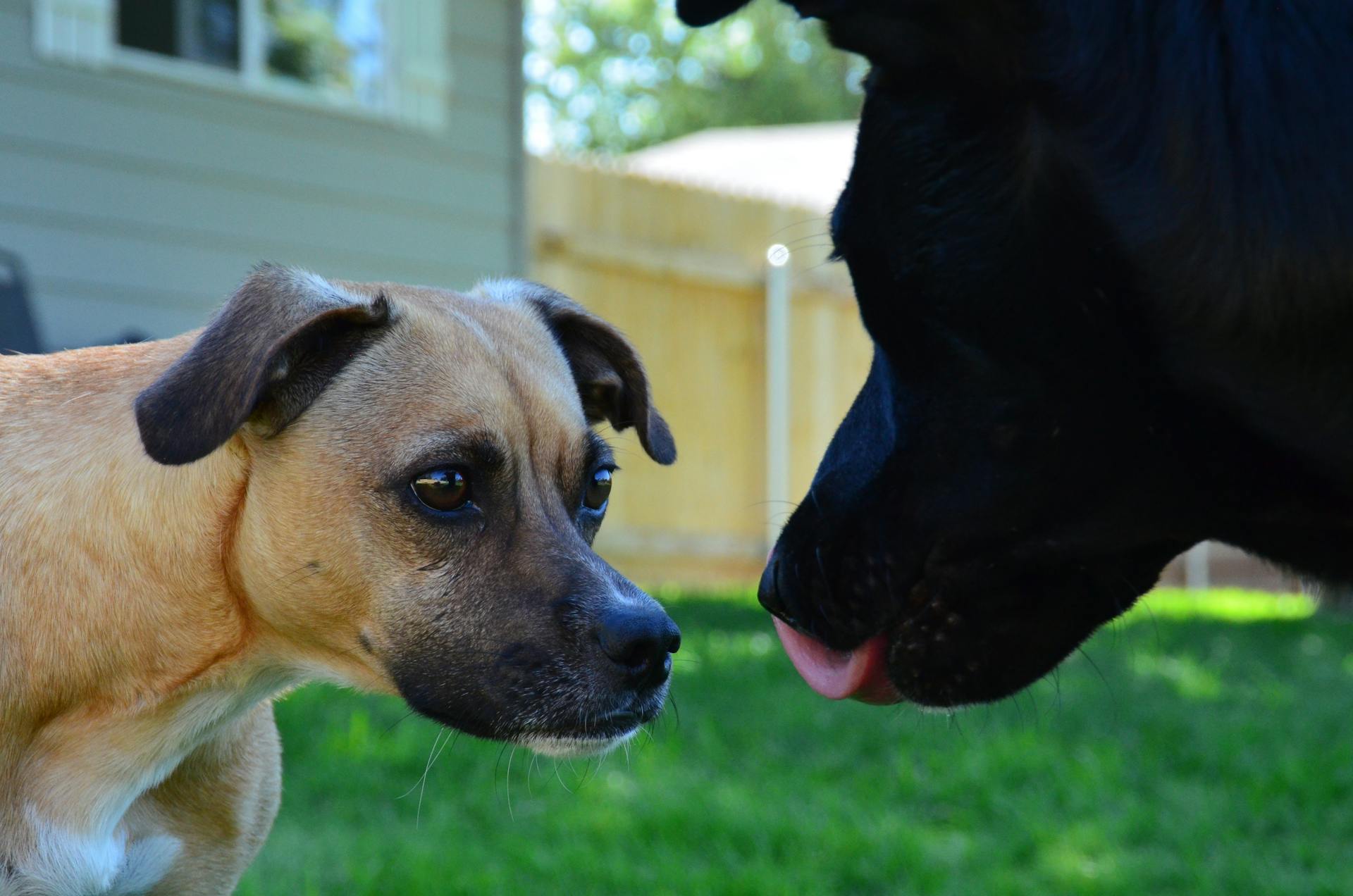
Dogs eating mice can be a natural behavior for some breeds, but it's essential to understand the risks and consequences involved.
Some dogs may view mice as prey, leading to a strong instinct to chase and eat them.
This behavior can be a result of a dog's genetic predisposition to hunt small game, such as terriers and hounds.
Dogs that eat mice may also be at risk of contracting diseases like leptospirosis and tapeworms.
It's crucial to take precautions when introducing dogs to areas where mice are present to avoid the spread of disease.
Veterinary Intervention
If your dog ate a mouse, it's essential to act fast and seek veterinary intervention. Your veterinarian may recommend inducing vomiting to expel the mouse and its toxins.
Providing your vet with information on the type of mouse poison involved, such as rodenticide, enables a more precise course of action. Continuous monitoring of your dog's vital signs and symptoms is crucial during this critical phase.
Help! Veterinary Intervention Needed

If your dog has ingested a poisoned mouse, veterinary intervention is crucial. It's essential to act quickly, as the sooner your dog receives treatment, the better.
Your veterinarian may recommend inducing vomiting to expel the toxins. This proactive approach helps eliminate the poison from your dog's system.
Providing your vet with information on the type of mouse poison involved is crucial. This enables a more precise and effective course of action.
Continuous monitoring of your dog's vital signs and symptoms is vital. This helps your vet track your dog's progress and make any necessary adjustments to their treatment plan.
Here are some common symptoms to watch out for:
- Weakness
- Lethargy
- Nose bleeds
- Vomiting
- Coughing up blood
- Gum bleeding
- Rectal bleeding
- Bloody stools
- Bruising
- Labored breathing
Intestinal Parasites
Intestinal parasites are a common problem that can affect dogs, and mice can be a primary source of infection. Mice can carry eggs or larval stages of intestinal parasites like roundworms, hookworms, and tapeworms.
If your dog ingests an infested rodent, it may experience diarrhea, which is a common symptom of intestinal parasite infection. Licking the anus is another possible sign, and it's not uncommon for dogs to develop increased appetite with weight loss.
Worms or worm segments in the feces are a clear indication that your dog has intestinal parasites. You may also notice a swollen abdomen, which can be a sign of a severe infestation.
Dogs can contract diseases including protozoal infections, intestinal parasite infestations, and bacterial infections when they eat mice. The symptoms can vary widely depending on the underlying cause of disease.
Here are some common symptoms of intestinal parasite infection in dogs:
- Diarrhea
- Licking the anus
- Increased appetite with weight loss
- Worms or worm segments in the feces
- Swollen abdomen
Pet Health Risks
If your dog eats a mouse, there's a chance they'll get sick from the parasites or diseases the rodent is carrying. The biggest concern is the possibility that the mouse has consumed poison, which can be serious for your pup.
Dogs can get sick from mice, and how sick they get depends on their health and what other kinds of germs/parasites the rodents had on them. If your dog is healthy and eats a completely clean and healthy mouse, there's no cause for concern.
Recommended read: Dog Eats Glass
Mice bones are brittle and soft, so they can't hurt your dog like sharp chicken bones can. However, since it's impossible to know what parasites the mouse is carrying, you should treat each rodent as though it's an infected mouse.
The best way to tell if your dog was affected by eating the mouse is to watch their health. If your dog shows any symptoms, report the incident to your veterinarian.
Here's what to report to your vet:
- Whether the rodent was dead or alive
- How much of the mouse your dog ate
- When your dog ate the mouse
- Your dog's age and size/weight
- Any symptoms your dog is showing
- Whether there are known rodenticides around your home
If your dog ate a poisoned mouse, remove any remaining parts from their access and check their mouth. Call your veterinarian and report the incident, and follow their instructions.
A poisoned mouse can seriously harm a dog, even if the toxin is only present in small amounts. If your pup has eaten a dead mouse or one caught near a populated area where people are likely to put out rodenticides, call your local pet poisoning hotline or your veterinarian immediately.
Rodenticide Poisoning

Rodenticide poisoning is a serious concern when your dog eats a mouse. If your dog ingests a poisoned mouse, it can take up to 6 days for the rodent to die, giving your dog plenty of time to capture and eat it.
The symptoms of rodenticide poisoning in dogs are often non-specific, including fever, increased thirst, lethargy, loss of appetite, and diarrhea. If you notice a change in your pup's demeanor with any clinical signs that lasts for more than 24 hours, a veterinarian should get involved.
If you suspect your dog has eaten a poisoned mouse, it's essential to let your veterinarian know the type of rodenticide you suspect was involved. This information will help the veterinary team monitor the right parameters and administer the correct emergency treatments.
There are several types of rodenticide poisons, including anti-coagulant, Vitamin D, and Bromethalin. Anti-coagulant poisons can be treated with vitamin K, while Bromethalin toxicity requires hospitalization and medications that decrease edema.

Dogs with anticoagulant poisoning will need to receive vitamin K to stop internal bleeding and stabilize the condition. It will take about 6 hours to restore clotting ability in the body, but full recovery takes 2-3 weeks.
Here's a summary of the treatment and recovery time for different types of rodenticide poisoning:
- Anticoagulant poisoning: 2-3 weeks of recovery time, with vitamin K administration and restricted exercise.
- Bromethalin poisoning: guarded prognosis, with at least 2 days of hospitalization and treatment, but lasting side effects are possible.
- Cholecalciferol poisoning: may cause permanent damage, with treatment being extremely expensive and drawn-out.
It's crucial to remember that even if the mouse wasn't poisoned, eating a mouse can still make your dog ill due to protozoan parasites, intestinal parasites, or pathogenic bacteria. Any time your dog eats a mouse, you should call your veterinarian immediately.
What to Do
If your dog ate a mouse, it's essential to report the incident to your veterinarian. They'll want to know if the rodent was dead or alive, how much of the mouse your dog ate, when it happened, your dog's age and size/weight, and any symptoms they're showing.
You should also remove any remaining mouse parts from the area and check your dog's mouth for any signs of poisoning. If there's a chance the mouse contains poison, take your pup to the emergency clinic immediately.

Here's a list of what to tell your vet:
- Whether the rodent was dead or alive if you know
- How much of the mouse your dog ate
- When your dog ate the mouse
- Your dog's age and size/weight
- Any symptoms your dog is showing
- Whether there are known rodenticides around your home
Your vet may induce vomiting if they suspect poisoning, and you should monitor your dog's poop for the next few weeks to catch any potential bacterial diseases or parasites.
Recovery Time from Poisoning
Recovery time from poisoning in dogs varies greatly depending on the type of poison, the amount ingested, and the promptness of treatment. If your dog ingests rodenticide, the recovery period will depend on several factors, including body size and the type of poison.
For anticoagulant poisoning, dogs need to receive vitamin K to stop internal bleeding and stabilize the condition. It will take about 6 hours to restore clotting ability in the body. However, full recovery takes 2-3 weeks.
With bromethalin poisoning, the prognosis is guarded and depends on the extent of brain damage from edema. Dogs will need at least 2 days of hospitalization and treatment.
Cholecalciferol poisoning may cause permanent damage. If your dog shows signs of kidney failure, treatment is extremely expensive and drawn-out.

Here's a rough estimate of recovery times for different types of poisoning:
Remember, every dog is different, and recovery time will depend on individual factors. If you suspect your dog has ingested poison, seek veterinary attention immediately.
What to Do If My Pet Ate Something
If your pet ate something they shouldn't have, it's essential to act quickly. Contact your veterinarian right away, even if you think it might be harmless.
Try to get as much information as possible about what your pet ate, including whether it was dead or alive, how much of it they consumed, and when it happened. Your vet will need this information to determine the best course of action.
If your pet ate a poisoned mouse, the effects can develop quickly, so it's crucial to get them to a vet as soon as possible. The vet may induce vomiting to remove the toxin from their system, and in some cases, activated charcoal may be prescribed to neutralize the poison.

If your pet is showing signs of illness, such as vomiting, diarrhea, or lethargy, seek veterinary attention immediately. These symptoms can be indicative of a range of health issues, including bacterial infections, parasites, or poisoning.
Some common signs of poisoning in pets include weakness, lethargy, nose bleeds, vomiting, coughing up blood, gum bleeding, rectal bleeding, bloody stools, bruising, and labored breathing.
Here are some steps to take if your pet ate a poisoned mouse:
- Remove any remaining mouse parts from the area
- Check your pet's mouth for any signs of poisoning
- Contact your veterinarian immediately
- Provide as much information as possible about what your pet ate and when
- Follow your vet's instructions for treatment
Remember, it's always better to err on the side of caution when it comes to your pet's health. If you're unsure about what to do, seek advice from a veterinarian.
Disease and Transmission
Poisoning is the number one concern after your dog eats a mouse. Mice can carry certain diseases and bacteria in their systems that can make your dog very sick.
Leptospirosis is a bacterial disease that can be transmitted to dogs through mouse contact. This disease can cause symptoms such as vomiting, diarrhea, and even kidney and liver failure.
Dogs may also contract tapeworms from eating mice that have tapeworms in their systems.
Symptoms and Effects

If your dog eats a mouse, it can lead to secondary poisoning, where the poison from the mouse affects your dog. This can happen within 2-36 hours, depending on the type of poison.
The type of poison in the mouse can cause different symptoms in your dog. Anticoagulants can cause internal bleeding 2-7 days after ingestion, while bromethalin can cause brain swelling and cellular death in about 2-36 hours. Cholecalciferol, on the other hand, can cause kidney damage or cardiac arrest in about 2-3 days.
Your dog may also become ill from pathogenic organisms if he eats a mouse. If you notice any symptoms in your dog days or weeks after eating a mouse, contact your veterinarian.
Here are some symptoms to watch out for:
- Internal bleeding (2-7 days after ingestion)
- Brain swelling and cellular death (2-36 hours)
- Kidney damage or cardiac arrest (2-3 days)
Signs of Illness
If your dog eats a mouse, watch for symptoms like vomiting, diarrhea, or lethargy days or weeks after the incident.
Dogs can also develop secondary poisoning from eating a poisoned mouse that hasn't shown signs of poisoning yet, so keep a close eye on their health.

Parasites or diseases carried by the mouse can cause a range of health issues, from mild to severe.
If your dog eats a completely clean and healthy mouse, there's no cause for concern, but it's impossible to know what parasites the mouse is carrying.
The best way to tell if your dog was affected by eating the mouse is to watch their health and reactions to it.
Rodenticide Poisoning Symptoms
If your dog ingested a mouse that consumed rat poison, secondary poisoning could make them sick. The level of toxicity depends on the timing, amount, and type of poison the rodent consumed and the number of rodents your pet eats.
Symptoms can appear quickly, often within 6-8 hours of ingestion. If your dog shows signs of poisoning, take them to the veterinarian right away.
Anticoagulant poisons can cause symptoms such as bleeding, bruising, and difficulty clotting. Vitamin K administration can help treat this type of poisoning.

Bromethalin toxicity requires hospitalization and medications that decrease edema. Cholecalciferol poisoning also requires hospitalization and treatment for at least a few days.
Here are some common symptoms of rodenticide poisoning:
- Bleeding or bruising
- Difficulty clotting
- Edema (swelling)
- Electrolyte imbalance
- Phosphorus levels
- Calcium levels
If you suspect your dog ate a poisoned mouse, remove any uneaten parts from their access and collect the packaging. Report the incident to your veterinarian and let them know how much your dog ate and what type of poison was involved.
The Effects of Consumption
If your dog eats a mouse that's been poisoned, the effects can be severe and even life-threatening. Anticoagulants can cause internal bleeding 2-7 days after ingestion, while bromethalin can lead to brain swelling and cellular death within 2-36 hours.
Cholecalciferol, or vitamin D₃, is the most lethal type of rodenticide, causing kidney failure or cardiac arrest within 2-3 days.
Depending on the type of poison and the amount consumed, your dog's symptoms may not develop for days or weeks. If your dog eats a mouse that's been infected with a disease, symptoms may take anywhere from hours to days to develop.
A unique perspective: What Country Eats Dogs

Here are the three major types of over-the-counter rodenticides and their effects on dogs:
If your dog eats a mouse, it's essential to monitor their behavior and stool for signs of illness, as symptoms may take time to develop.
My Cat Died
If your cat died from eating a mouse, it could have been due to the parasites or fleas that the mouse carried.
You can still get intestinal worms from a mouse, even if your cat didn't eat the mouse.
If you catch your cat chasing and killing mice, do your best to keep your cat away from mice in the future if you can.
Watch for signs of parasitic infections in your cat, such as stomach aches or digestive upset.
If your cat has these symptoms, call your veterinarian.
Prevention and Action
If your dog likes to dig small holes, they might find wild mice and think they found dinner. If your dog ate a mouse that is a carrier of tapeworm, then eating a live mouse might cause your dog to eat the tapeworm larvae.
Contact your dog's vet if they are suffering from abdominal pain or weight loss. They also could have eaten roundworm larvae.
Preventing your dog from eating mice is key. If your dog is a digger, supervise them when they're outside and block off any holes they might dig.
Frequently Asked Questions
Is it normal for dogs to catch mice?
While dogs can catch and kill the occasional mouse, they aren't naturally inclined to hunt them like cats are. If you have a mouse infestation, a dog's help may not be enough to make a significant impact.
What happens if mice get into dog food?
If mice get into dog food, they can contaminate it with diseases like plague, typhus, and rabies, posing a risk to both dogs and humans who handle the food
What to do if your dog has a mouse in his mouth?
If your dog has ingested a mouse, take them to the vet immediately, as they may need fluid therapy and other treatment. In the meantime, you can try inducing vomiting with 2 tbsp of hydrogen peroxide, but consult a vet first.
Featured Images: pexels.com


